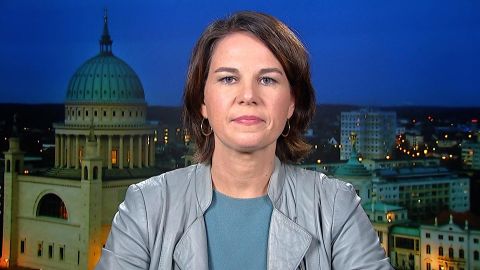Read Transcript EXPAND
CHRISTIANE AMANPOUR: COVID is still surging in Germany and it’s weaving its deadly trail around the world. In the United States, there’s been a recent uptick in vaccinations, but 26 percent of adults are still unprotected. And there may be a hidden economic impact. Michelle Singletary is a finance columnist for “The Washington Post.” And her new op-ed “Fired, Sick or Both” digs into the cost of refusing an inoculation. Here she is speaking to our Michelle Martin. (BEGIN VIDEO CLIP)
MICHEL MARTIN, CONTRIBUTOR: Thanks, Christiane. Michelle Singletary, thank you so much for joining us.
MICHELLE SINGLETARY, PERSONAL FINANCE COLUMNIST, THE WASHINGTON POST”: Oh, it’s my pleasure to be here.
MARTIN: So, many people will know you as a person who’s been writing about personal finance for quite some time. Now, you’ve been writing about the impact of being unvaccinated may have on people’s personal financial situations. Now, as we are speaking, those numbers are creeping up, but there’s still a significant number of eligible Americans who are not yet vaccinated. And you’re saying that companies are starting to pressure people. What are some of the ways they’re starting to do that?
SINGLETARY: Well, for example, Delta announced that it’s going to do a surcharge for those unvaccinated employees who choose not to get vaccinated. And many companies, especially now that the Pfizer drug has full FDA approval are saying, get vaccinated or you could lose your job. And companies have fired people for not getting vaccinated. And I wanted to write a column to take it away from the politics and all the yelling and screaming and, you know, accusing people of being anti- vaxxer in a very negative way because you can’t persuade people that way. They just dig in. And so, I wanted to write a column to say, hey, OK, you have a right to not get this vaccination, but it’s going to cost you and the cost could be astronomical to you and to your family.
MARTIN: Delta Airlines, they’re going to start imposing a surcharge in place and insurance who are choosing not to be vaccinated, who are eligible to be vaccinated. And what’s the logic of that?
SINGLETARY: That’s right. So, it’s a $200 surcharge and they’re finding that when employees are hospitalized, it cost up to $50,000. Now, on average Kaiser Family Foundation found that it was about $20,000, but that’s the average. So, more or less, right? And so, it’s going to get to the point where employers and hospitals and insurers are saying, if you choose not to get vaccinated, you might have to cover that full cost. Right now, there’s a lot of grace to people because this is — you know, we’re just still in the middle of it and people, you know, may be unsure, but once Pfizer got full approval — and mind you, let’s just say, all the vaccines had approval, emergency approval. So, it’s not like some sort of wild, wild, wild west, they’d give you these shots, it went through rigorous studies and science for the vaccine. But if that comes to the point where more and more employers and you’re not getting vaccinated, they’re going to say, you bought this bill because you decided not to get vaccinated.
MARTIN: You know, CNN Houston Methodist — the Houston Methodist Health System has fired employees for refusing to be vaccinated, particularly relevant to their particular job function, like the fact that they had to interact with other employees or patients sort of closely. Is it pretty well-established at this point that employers do have the right to compel their employees to get vaccinated? Has that been pretty well-established?
SINGLETARY: I wouldn’t say pretty well, but it’s going to go against you. So, in Houston, about 153 people either they got fired or they had to resign. And some of those employees took their case to the court and the case was dismissed because the judge said, this is a health system and these are health professionals trying to help people with COVID. And so, to get vaccinated, protect them and to protect the patients and the staff, and so, it’s good cause to have them require employees to be vaccinated. So, the judge tossed the suit out. But the EEOC has been releasing updates and bulletins to employers. And as long as accommodations are made and provided and you still — and if you still refuse it, then they have a right. According to the EEOC, early guidance that they have a right to fire you or deny you employment if you don’t get vaccinated.
MARTIN: What are some of the other ways that being unvaccinated could cost you, and as you say, astronomically?
SINGLETARY: Well, one way is you lose your job. While you’re looking for another job, you may not get unemployment insurance. Because if the employers require it and it’s something that’s protecting their staff, and you say no, then you could be denied benefits. So, what are you going to do to prepare for your family? And more and more employers are requiring it so that it’s going to take you longer to find a job that you can replace that income. And let’s be real. Death itself, you die, who’s going to pay your bills for your family? And we already know that many families don’t have enough life insurance, they don’t have enough savings. And so, particularly, if you’ve got underage children, 18 and younger, who can’t work, can’t get a job, what’s going to happen to them? And then look down the road, people aren’t good about that, looking down the road, but we know the long haulers, those people who have symptoms from COVID long after it’s gone, we don’t know how that’s going to cost you medically in terms of neurological issues. And so, that could cost you down the road in terms of long-term care. And many people don’t realize that long-term care is not covered by your health insurance. It’s not covered by Medicare. And so, that could cost you down the road.
MARTIN: And what I think I hear you saying is even if — you may not be covered even if you do have insurance for those — through that long-term rehabilitation process, even if you do have insurance.
SINGLETARY: Yes. That’s true. I mean, we are in a gray area, right. And the EEOC and government agencies are giving guidance. They’re not saying it’s an absolute, but they’re saying, we know that the vaccine can keep you from dying or having severe effects. If you choose not to, that some of that cost or all of that cost could be put on you somewhere down the road. Because if not, we all pay for someone’s individual decision not to get vaccinated. Because if the cost of health care goes up significantly, they’re spread across all the base of people who are insured. And eventually, people are going to go, I’m not going to pay this extra money because you made the chose not to get vaccinated.
MARTIN: Is there any precedent for this though? Because I thought that one of the principles of the Affordable Care Act was not to punish people for pre-existing conditions. Now, I think you could argue about whether having COVID as a preexisting condition when it’s something that was foreseeable. I mean, this was a contagious respiratory virus that the entire world has been dealing with. So, it’s not like it’s something that was sort of unknown to you. But, I mean, how does that sit with you, charging people more for their insurance because of a decision they make? I mean, is there a precedent for this? For example, could you charge people more for choosing to smoke? It’s been known for quite some time that smoking has a deleterious effect on health, right? So, could people charge smoker more? Is there some precedent for this that people are pointing to, that insurers can points, the employers can point to?
SINGLETARY: Yes. I mean, well, they do charge smokers more. To your point about pre-existing condition, that is true. But you know how law works, right? People challenge it, they go to court, it could take years. And during that time, you’ve got to flip that bill. And so — and it is a slippery slope, right? So, if we’re going to charge people who chose not to get the vaccine, what about people who had type 2 diabetes, for example, who — maybe their health — lifestyle created this condition? And so, I think the courts might end up being clogged with a lot of cases people arguing against it, and that’s well and good. That’s how our system works. But I want to talk to the individual who is deciding not to do this, and can you bear that cost? Can you fight through a legal case while you don’t have a job or you’ve got to pay these premiums until it gets worked out in the legal system? You know, I’ve been looking at GoFundMe pages of people who have died from COVID and asking for money from their surviving children and spouse, which tells me that there was no money put in place, not enough life insurance or savings, and I get that. It’s hard to say for something like this, of course, but it also shows that people need to think about who you’re going to leave behind or who else in your family is going to be impacted by not having that vaccine. And we have heard countless stories of people on their deathbed from COVID saying, I regret this decision. I’m leaving my children and dying. And who’s going to take care of them? And that’s what I want to say. I get it. I was scared when this first came out. And as an African-American, we don’t trust the health system because we know there were a lot of discrimination going on. You know, we always talk about the Tuskegee incident. And so, I get it. I understand why you’re afraid. But when I looked at the research and looked at it outside the sort of political bubble that we are in, I chose to get vaccinated because I want to be here for my kids. I want to be here for my husband. I don’t want to endanger my coworkers and their children. Let’s remember that there’s — children under 12 can’t get the vaccine. And although the deaths and illness from children statistically is less, do you want your kid to be that statistic? Because that’s not what you’re going to say at their funeral, like, oh, most children don’t get sick and die. You’re not going to say that if that’s your child.
MARTIN: A lot of people said that they were worried that if they got sick from the side effects, that they miss work.
SINGLETARY: So, if you get sick from the side effects, you’re going to be home and possibly without pay. Get that, when I got the shot, I got a little sick. And for a day, I, you know, took a sick day because it was just like a cold. But, again, think about long-term. You might not get paid for two days, but if you don’t take that shot and you die, you’re not going to get paid for a lifetime and your children are going to be impacted. And that’s real, right? So, a couple of days of no pay and being sick and a lifetime of your children struggling or your spouse struggling, and you’ve got to weigh those two. And I’d say you need to opt for even if you have to take off a couple of days without pay to live.
MARTIN: Are there, though, any religious or health requirements or exemptions that you do find credible? Because it is a fact that people do have diverse religious perspectives. Some people do have objections to what they believe to be the research — the research models that led to these vaccines. Although, I do want to point out again that, you know, Pope Francis has encouraged people to be vaccinated. So, the argument that, you know, fetal tissue was involved and therefore, it’s unethical, it would seem he would be the ultimate authority on that, and he has decided that vaccines should be taken to save lives, especially to save vulnerable lives. But are there any specific health or religious exemptions that you think are credible that should be respected?
SINGLETARY: No. There are certainly some people who, perhaps, have some respiratory issues, for example, they can’t wear masks or there’s, you know, some research that shows that, you know, the potential for getting blood clots. And I actually suffer from blood clotting condition. I’ve written about it. So, I’m happy to talk about it. I have a protein S deficiency, which makes me prone to blood clots. And so, we have some studies that show that some people might be prone to blood clots. I did it anyway because I’m on medication and there’s a way to treat the blood clots more effectively than it is to treat COVID long-term. So, there are some exemptions and the law provides for that. You know, the Americans Disability Act says, if someone has a disability or some religious objection and you have — employers have to accommodate those. So, there is — even in the law, there is a carve out for people who have legitimate, legitimate, that’s key, reasons for not getting the vaccine. And if they take precautions on the job or they provide them, I should say, accommodations, then there is a carve out for those folks. However, if you stock shelves and your employer says, you must get vaccinated that’s not an accommodation they can make for you. You can’t stock shelves from home. And so, that’s something you have to consider. And it maybe that you have to say, I can’t keep this job or you will be fired. And I think in the age of COVID, that is appropriate.
MARTIN: Michelle, are you at all concerned, though, that companies that are starting to impose these vaccine mandates will start imposing other requirements and that might lead to a slippery slope?
SINGLETARY: There is a possibility, but I’m not concerned right now. COVID is so lethal and has so many long-term effects that I think right now we have the ability to reduce the number of people who are getting COVID. And it’s such a — when you get diabetes, it effects maybe just your family, but COVID has the potential to affect not just your family but your neighbors, your friends, your coworkers. And I think that there can be a case made that if you choose, the science is there, the vaccine works, it will reduce your ability — even if there’s some breakthrough cases, you’re less likely to get very, very sick and be hospitalized and die. And I think that is the difference. And I’m not as concerned about that.
MARTIN: A lot of places have offered incentives like, you know, metro cards or, you know, lotteries to get — in some cases like some tuition paid at community college. I mean, some of these incentives have been pretty lavish and some of them have been, you know, cute, you know, you get a free beer, show your vax card and you get a free beer and you get ice cream, something of that sort. What’s your take on that? Do you think that’s moved the needle at all?
SINGLETARY: I think it’s moved a little. But — and you know, in states and areas where they have a lottery, like here, they did here in Maryland, vaccination rates did go up. Listen, Americans love getting stuff free, they love a discount, they love that two for one kind of deal. And if that’s going to — well, if that’s what it takes to get people on the fence — and those, I think, people are like, I’m not so sure, then that moves them over to the vaccination column, and I’m OK with that because that cost is going to be a lot less than the societal cost of people being sick or dying or not even being able to work. Listen, your employer may not require you to get vaccinated and may say, listen, come in. You don’t even have to have any mask. However, if you get sick and your coworker gets sick, that business could shut down, all of you lose your job. Your coworkers, people you care about could lose their job. Your kids could get sick. And so, that’s also an effective appeal, I hope. There are some people we’re just never going to persuade, and that’s very unfortunate. And while some people gleefully tweet about those folks who have died from COVID who were anti-vaxers, I don’t think we should be gleeful because the cost to all of us is too high. And we have to continue to do whatever we can do to persuade those people who are on the fence and maybe don’t really have the knowledge, the right knowledge.
MARTIN: Michelle Singletary, thank you so much for talking with us.
SINGLETARY: Thank you for having me.
About This Episode EXPAND
Robert Grenier and Ashley Jackson; Annalena Baerbock; Michelle Singletary
LEARN MORE


